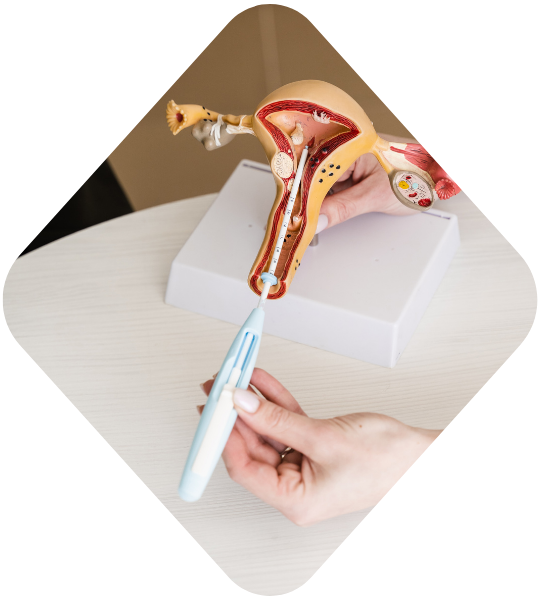Intrauterine Insemination (IUI)
At Eva IVF & Women’s Centre, we understand that struggling with infertility can be emotionally challenging. If you and your partner have been trying to conceive without success, Intrauterine Insemination (IUI) could be a simple, effective, and minimally invasive fertility treatment to help you achieve pregnancy. This guide will walk you through the complete IUI treatment process, from preparation to post-procedure care, so you know exactly what to expect.
What is IUI and How Does It Work?
Intrauterine Insemination (IUI) is a fertility treatment where washed and concentrated sperm is directly placed inside the uterus using a fine catheter. This process bypasses natural barriers, ensuring that a higher number of healthy sperm reach the egg, increasing the chances of fertilization.
Who is IUI for?
IUI is an effective option for:
✔ Women with unexplained infertility
✔ Women with mild endometriosis or cervical mucus issues
✔ Men with low sperm count or motility
✔ Couples experiencing sexual dysfunction preventing intercourse
✔ Women using donor sperm
If you have blocked fallopian tubes, severe male infertility, or advanced age-related infertility, IVF may be a better option.

Step-by-Step IUI Treatment Process
Before starting IUI, our fertility specialist will:
✔ Conduct a comprehensive medical evaluation for both partners
✔ Perform blood tests and ultrasounds to assess ovulation and uterine health
✔ Conduct a semen analysis to check sperm count, motility, and morphology
💡 If sperm parameters are too low, we may recommend IVF instead of IUI.
IUI is most successful when performed during ovulation. There are two ways to track ovulation:
🔹 Natural Cycle IUI: If you have regular ovulation, no medications are needed. We track your cycle and schedule the IUI when ovulation naturally occurs.
🔹 Medicated IUI: If you have irregular ovulation (PCOS, hormonal issues), we use fertility drugs like:
- Clomiphene Citrate (Clomid) or Letrozole (Femara) – Stimulate egg development
- Gonadotropin Injections (FSH, hCG) – Trigger ovulation if needed
How is ovulation monitored?
We track follicle development using:
✔ Transvaginal ultrasounds to monitor egg growth
✔ Hormone blood tests to measure estrogen and LH levels
Once the follicle reaches 18-22mm, an hCG injection (trigger shot) is given to stimulate ovulation within 24-36 hours.
On the day of IUI, the male partner provides a semen sample, or we use donor sperm if needed. The sperm is then "washed" in the lab to:
✔ Remove impurities and non-motile sperm
✔ Concentrate the most active, high-quality sperm
✔ Increase the chances of fertilization
Why is sperm washing important?
Unwashed semen contains proteins and prostaglandins that can cause uterine contractions, making insemination less effective or even painful.
Timing: The IUI is performed 24-36 hours after ovulation trigger to ensure the sperm meets the egg at the optimal time.
Procedure Steps:
✔ The woman lies on the exam table, similar to a Pap smear.
✔ A thin, soft catheter is inserted into the uterus through the cervix.
✔ The washed sperm sample is injected directly into the uterus.
✔ The procedure takes 5-10 minutes and is completely painless (some mild cramping may occur).
After the procedure: You will rest for 10-15 minutes before resuming normal activities.
Before IUI – How to Prepare?
✔ Maintain a healthy weight to optimize fertility
✔ Take prenatal vitamins & folic acid for egg health
✔ Avoid alcohol, smoking, and excessive caffeine
✔ Reduce stress with yoga, meditation, or light exercise
Immediate Post-IUI Care
✔ Avoid vigorous exercise, heavy lifting, or sexual intercourse for 48 hours.
✔ Mild spotting or cramping is normal after the procedure.
✔ Continue taking prenatal vitamins and progesterone supplements (if prescribed).
When to Take a Pregnancy Test?
- A blood pregnancy test (beta HCG) is taken 14 days after IUI to check for pregnancy.
- Avoid early home pregnancy tests, as trigger shot hormones may cause false positives.
Success Rates of IUI – What Are Your Chances?
The success of IUI depends on age, egg quality, sperm quality, and underlying fertility conditions.
📊 IUI Success Rates Per Cycle:
- 10-15% per cycle for women under 35
- 7-10% per cycle for women aged 35-40
- Less than 5% per cycle for women over 40
✔ If IUI is unsuccessful after 3-6 cycles, we may suggest IVF for better chances.
Why Choose Eva IVF & Women’s Centre for IUI?
🌟 Expert Fertility Specialists with years of experience
🌟 Advanced Sperm Washing & IUI Techniques
🌟 Affordable & Personalized Treatment Plans
🌟 High Success Rates with Individualized Care
At Eva IVF, we are committed to making your IUI journey smooth, stress-free, and successful.
